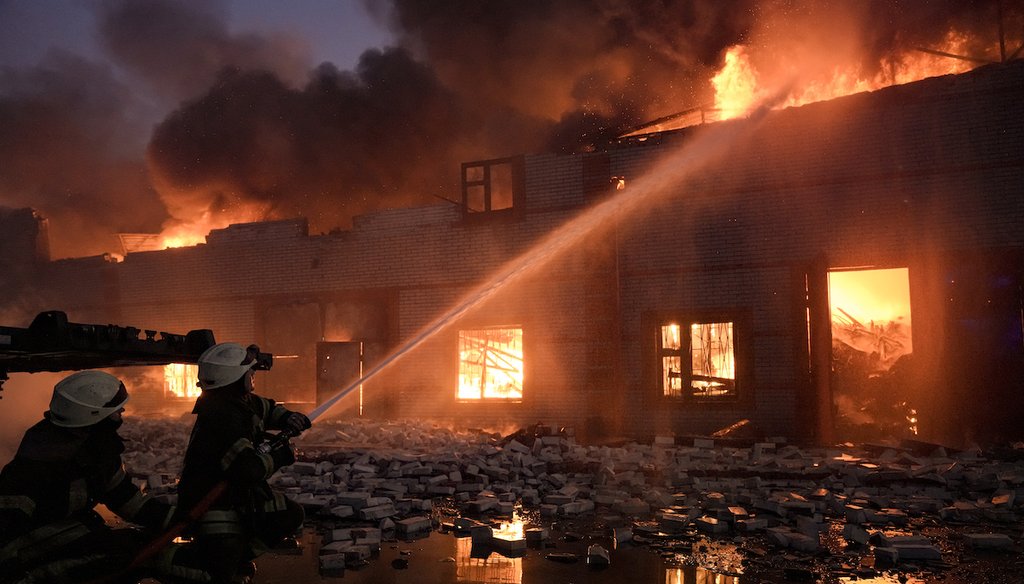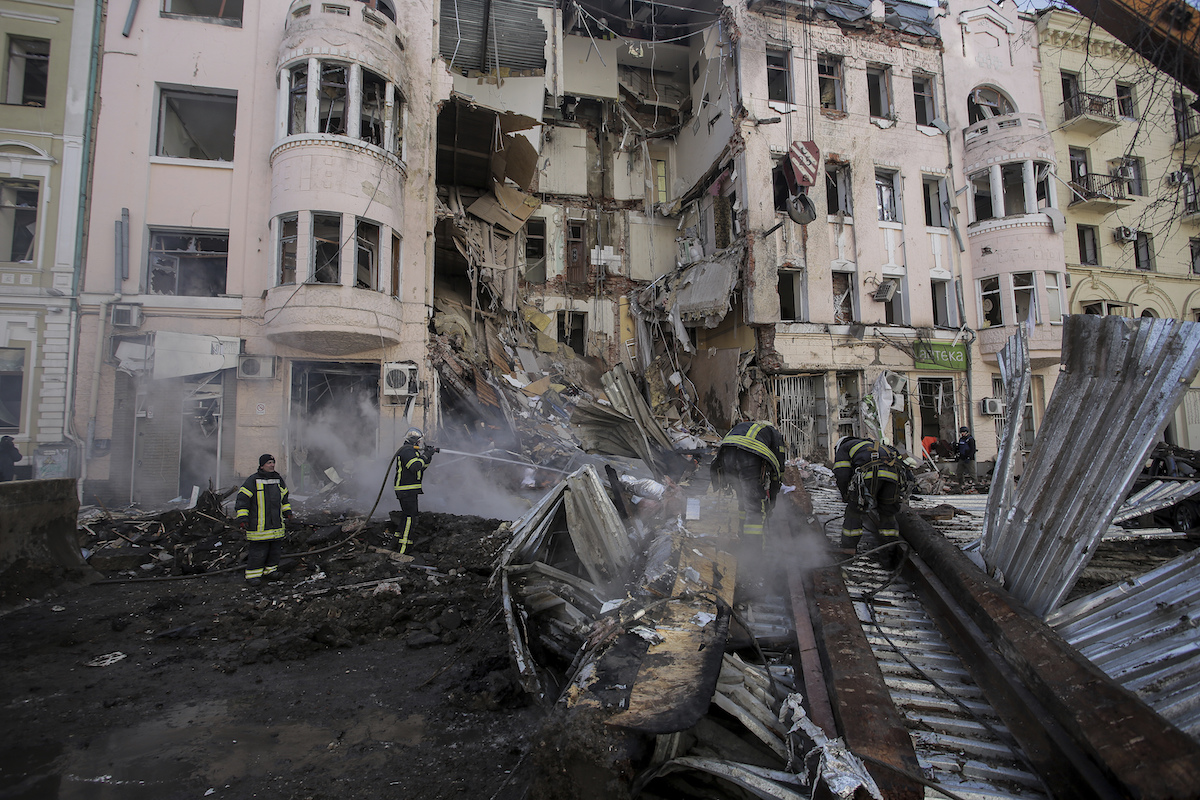Stand up for the facts!
Our only agenda is to publish the truth so you can be an informed participant in democracy.
We need your help.
I would like to contribute

Ukrainian firefighters battle a blaze at a warehouse after a bombing on the outskirts of Kyiv, Ukraine. (AP)
If Your Time is short
-
While platforms like Facebook are banned, Russians can still get outside news through the internet.
-
Reading independent journalism is allowed, but sharing it could lead to a 15-year jail sentence.
-
Most older Russians rely on state-controlled television for their news.
Russia has brought a new intensity to its crackdown on independent news.
It is now a crime — punishable by up to 15 years in prison — to publish "fake" information about the all-out attack on Ukraine. The government has blocked Facebook, Instagram, Twitter and news websites aimed at Russians, such as Latvia-based Meduza. It is a crime for the average citizen to publicly post information that contradicts the government line.
In a March 16 meeting, Russian President Vladimir Putin spoke of a "necessary self-purification" and called on Russians to cast out any dissenting voice.
"The Russian people will always be able to distinguish true patriots from scum and traitors and simply spit them out like a bug that accidentally flew into their mouths," Putin said.
Natasha Rastova, a former Russian journalist and author of two histories of Russian journalism, said the restrictions on free speech marked a turning point, even by Russian standards.
"In a matter of days, Putin went from being the leader of an authoritarian state to becoming a full-scale dictator," Rostova said.
Despite the new restrictions, Russians can still access news from outside. The risk comes in sharing it.
Russians who want outside news have to be adaptable. Facebook is banned, but with software called virtual private networks, users can circumvent restrictions.
That said, special apps are not essential. Broadly, the internet still operates. Connection speeds might be slower after a leading internet service provider Cogent dropped its service in Russia, but Russians can read articles from the BBC, CBS News and other news organizations. They can watch videos on YouTube.
"Despite all the efforts of the Russian authorities to clean up the information space, alternative sources of information still exist in Russia," said Viktor Muchnik, who ran the independent news website TV2 in Tomsk, Siberia, with his wife Viktoria.
We reached Muchnik in Armenia, where he fled after the government shut down TV2 March 7.
Many younger Russians use the encrypted messaging app Telegram to follow Russian-speaking reporters they trust. They can see reports, photos and videos within the app, or open links they find there.
This video report on the Russian bombing of a Maruiopol theater was shared on Telegram. (Screenshot)
Telegram’s reach is limited. A 2021 survey by the Moscow-based Levada Center found that about 16% of Russians used it, although the app’s share was rising rapidly. The messages are secure, but Muchnik warns, even the encrypted service is not entirely risk free.
"It should be understood that Telegram channels today are being hunted down by the security forces," Muchnik said.
Russians know they might be stopped by police who demand to see their phones.
"In the event that someone is stopped and searched, even just having those apps on one’s phone could be risky," said Paul Goode, the McMillan Chair of Russian Studies at Carleton University in Canada.
Russians risk severe penalties if they are caught sharing banned information.
"Russians can be fined and prosecuted for facilitating the dissemination of ‘fake news’, discrediting Russia’s army, and supporting international sanctions on Russia," Goode said. "This includes posts and re-posts made on social media, including even posts made by other people on one’s discussion thread."
While younger Russians get their news from the internet, older Russians watch television.
The 2021 Levada Center survey found that 86% of people 55 and older primarily get their news from television. Among adults under 40, the fraction was about half that, 45%.
As you might expect, the numbers flip for those who rely on the internet for news. A quarter of the older group turn to the internet, compared to 55% of those between 18 and 39.
The strong link between age and information source creates a rift in world views.
"A lot of people still watch television, which is completely controlled by the state," said Anton Shirikov, researcher and Ph.D. candidate at the University of Wisconsin-Madison. "These people tend to be older, from smaller towns or villages."
Television delivers the government’s message. When Putin made false claims about the people of Donbas facing genocide at the hands of the Ukrainians; of the U.S.-backing bioweapon labs in Ukraine; and of Russia having "no other option for self defense," that is what Russian television reported.
The massive bombing of Ukrainian cities and civilian deaths are minimized.
Firefighters extinguish an apartment house fire after a Russian rocket attack in Kharkiv, Ukraine's second-largest city. (AP)
When younger Russians show their parents videos of missiles hitting apartment blocks in Ukraine, they face denial. Michnik said it goes against the message their parents have been hearing virtually every day for eight years, since Russia annexed Crimea.
Jonathan Becker, a political scientist at Bard College, shared a message he got from a friend inside Russia. The friend’s wife installed Telegram on her mother’s phone. The mother is a Putin supporter.
"She still thinks that all the videos she watches are Ukrainians bombing themselves," the email said. "What can one say?"
The Russians we contacted all said that these intergenerational splits are common.
They and other observers also raised the concern that international efforts to pressure Russia economically could undermine access to outside news. When Visa and Mastercard stopped processing credit cards in Russia, that affected some internet users.
"It is increasingly difficult for Russians to pay for foreign services like virtual private networks, so it’s conceivable that this escape hatch could be closed off eventually by the impact of international sanctions," said Goode.
There is also the fear that some of YouTube’s restrictions on advertising revenues inside Russia could make it harder for independent journalists to finance their work.
Russian journalist Mikhail Fishman was an anchor for the independent station TV Rain until he left Russia on March 3. He said unintended ripple effects could become even more important as Russians begin to feel the sting of economic sanctions.
"The more impact the sanctions have, the more will be the demand for alternative sources of information," Fishman said.
Our Sources
Kremlin, Meeting on measures of socio-economic support for the regions, March 16, 2022
Levada Center, Russian media landscape 2021, May 8, 2021
Accent, Inside the TV2 Newsroom: How an Independent Publication Survives in Russia, accessed March 15, 2022
Harvard Kennedy School, Tracking social media takedowns and content moderation during the 2022 Russian invasion of Ukraine, accessed March 14, 2022
Conflict Intelligence Team, Daily Ukraine report, March 14, 2022
Committee to Protect Journalists, CPJ urges countries to give refuge to Russian journalists after Georgia refuses entry to Dozhd TV’s Mikhail Fishman, March 7, 2022
TASS, The State Duma Committee approved an amendment on imprisonment up to 15 years for fakes about the RF Armed Forces, March 3, 2022
Present Tense, The State Duma approved an amendment on imprisonment up to 15 years for "fakes about the Russian army", March 3, 2022
Europe-Asia Studies, Making Sense of the News in an Authoritarian Regime: Russian Television Viewers’ Reception of the Russia–Ukraine Conflict, Jan. 18, 2022
Europe-Asia Studies, Mind the Gaps: Media Use and Mass Action in Russia, Feb. 25, 2015
British Journal of Political Science, Online Social Media and Political Awareness in Authoritarian Regimes, Sept 24, 2013
East European Politics, Social media and regime support in Russia: does it matter which website is used?, Aug. 23, 2019
Nieman Lab, "An information dark age": Russia’s new "fake news" law has outlawed most independent journalism there, March 7, 2022
Committee to Protect Journalists, Russian forces in Ukraine detain and harass journalists; authorities clamp down on Russian media, March 10, 2022
Media Matters, A pro-Russia propaganda campaign is using over 180 TikTok influencers to promote the invasion of Ukraine, March 11, 2022
Poynter, The grim consequences of Russia’s media blackout, March 7, 2022
Poynter, Russia outlaws spreading ‘fake news’ about the Russian military with fines and prison, March 7, 2022
NBC News, Russia is nearly isolated online. What does that mean for the internet’s future?, March 15, 2022
CNET, Inside Cogent's Decision to Curtail Russia's Access to the Internet, March 13, 2022
Euro News, How Russia could cut itself off from the global Internet, and why it probably won't, March 14, 2022
ZDNet, Internet service provider Cogent cutting off access to Russian customers, March 4, 2022
Telegram exchange, Mikail Fishman, Russian journalist, March 16, 2022
Telegram exchange, Viktor Muchnik, editor-in-chief, TV2, March 16, 2022
Interview, Anton Shirikov, Ph.D. candidate in comparative politics, University of Wisconsin-Madison, March 15, 2022
Interview, Natasha Rostova, Russian media historian, graduate student, Department of Journalism, University of Maryland, March 17, 2022
Email exchange, Paul Goode, associate professor and McMillan Chair of Russian Studies, Carleton University, March 15, 2022
Email exchange, Jonathan Becker, assistant professor of political studies, Bard College, March 16, 2022
















































